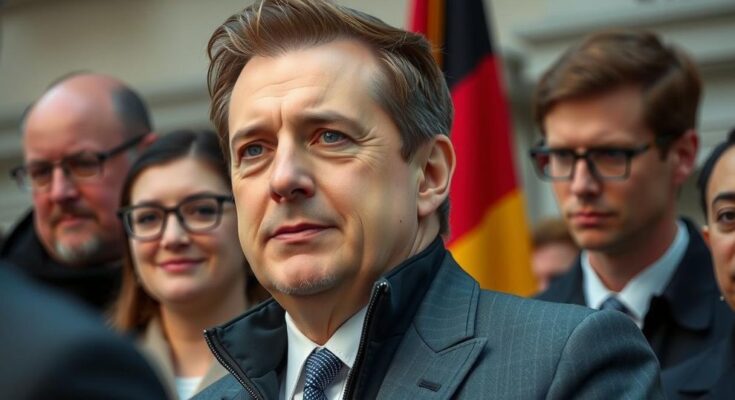Elon Musk’s endorsement of the far-right AfD party in Germany has led to controversy, prompting the government to downplay his influence ahead of the upcoming election. Statements from government officials emphasized the party’s extremist classification and Musk’s attempt to sway public opinion, while the media engages in discussions regarding free speech and the appropriateness of giving Musk a platform.
The German government is attempting to mitigate the implications of Elon Musk’s recent endorsements of the far-right Alternative for Germany (AfD) party in the lead-up to the nation’s general election. Musk’s comments in a prominent German newspaper over the weekend ignited controversy and resulted in the resignation of the newspaper’s opinion editor in protest. Government spokesperson Christiane Hoffmann acknowledged Musk’s attempts to influence the electoral process while expressing that the AfD is under scrutiny by Germany’s domestic intelligence due to suspicions of right-wing extremism.
This looming early election, set for February 23, follows the collapse of Chancellor Olaf Scholz’s coalition government, stemming from economic revitalization disputes. Musk characterized the AfD as the “last spark of hope” for Germany, asserting that the party could usher in a future focused on economic growth and innovation. Despite the party’s current favorable polling, its candidate, Alice Weidel, faces significant obstacles in her bid for chancellorship due to other parties’ unwillingness to collaborate with the AfD.
Moreover, Musk challenged perceptions of the AfD as extremist, pointing to Weidel’s same-sex relationship as evidence against claims of the party’s radicalism. His remarks have prompted a broader discussion in German media regarding the limits of free expression, leading to Evan Marie Kogel’s resignation from the newspaper’s opinion section amidst criticism for providing a platform to Musk. Conclusively, while Musk maintains that his investment in Germany grants him insight, many consider the AfD’s association with extremism detrimental to Germany’s political landscape.
In the context of Germany’s political atmosphere, the Alternative for Germany (AfD) party has garnered increasing attention, operating as a far-right political entity. It is under continuous surveillance by domestic intelligence due to its extremist leanings. The nation is preparing for general elections following a breakdown of the current governing coalition, which amplifies the significance of external influences like Musk’s endorsements. The debate over Musk’s opinions illustrates the tensions surrounding freedom of speech and political engagement by influential figures.
In summary, the German government is actively addressing the ramifications of Elon Musk’s support for the AfD as the country approaches an important election. Musk’s public endorsements have sparked significant media debate, highlighting issues surrounding political extremism and foreign influence in domestic affairs. As the political landscape evolves, the implications of such endorsements will remain a critical aspect of Germany’s electoral discourse.
Original Source: apnews.com




